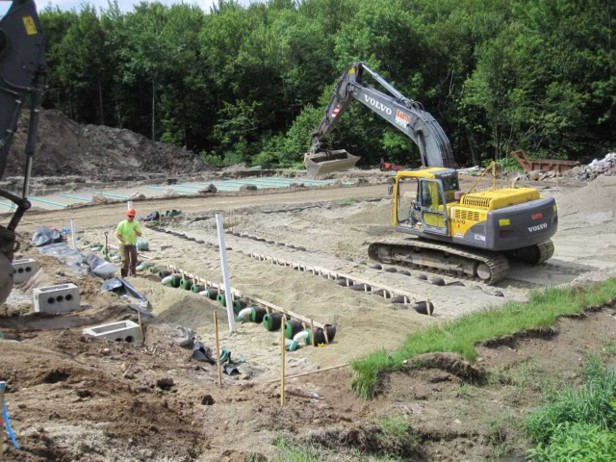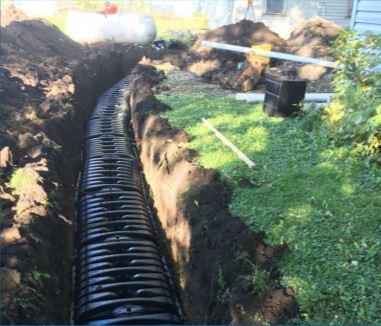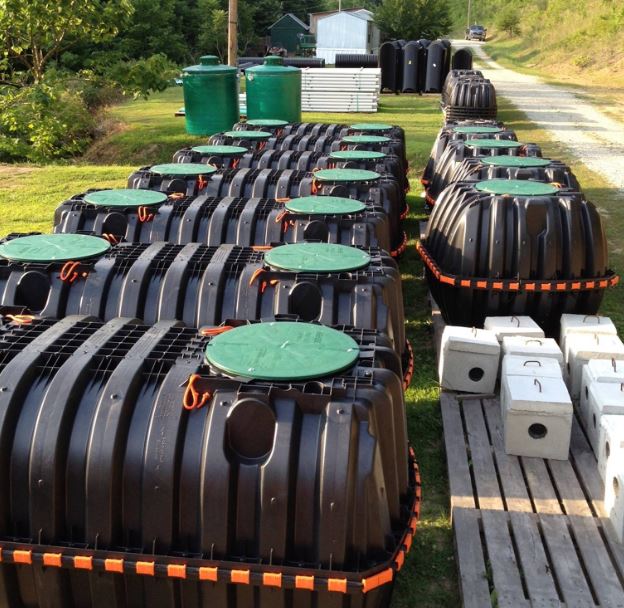Decentralized Solutions for Community Wastewater Treatment Challenges
Posted on by Dennis Hallahan
There are many decentralized wastewater treatment options available to small towns and communities. Here at Infiltrator we’ve had the privilege of working with communities, engineers, and installers to bring customized wastewater treatment options to these areas. Here are a few examples of how Infiltrator assisted small communities with fulfilling their wastewater treatment requirements and saving the expense of a wastewater treatment plant.
Example 1: Blodgett Landing in Newbury, NH
 In 2001 the community of Blodgett Landing was faced with the decision of investing in a wastewater treatment plant or upgrading the existing treatment system which was installed in 1959. For half the cost of a wastewater treatment plant the community decided to implement a passive treatment, denitrification, and dispersal system using Enviro-Septic. The Enviro-Septic treatment system installed included 4,100 LF of pipe and was designed to treat flows of up to 50,000 GPD. The Enviro-Septic pipe uses passive filtration with recirculation and bacterial ecosystems, eliminating the use of harmful chemicals or an external power source. The treatment process is 100 percent green enabling Newbury to protect its natural resources. The system also performs well in varying climates including freezing temperatures in colder months.
In 2001 the community of Blodgett Landing was faced with the decision of investing in a wastewater treatment plant or upgrading the existing treatment system which was installed in 1959. For half the cost of a wastewater treatment plant the community decided to implement a passive treatment, denitrification, and dispersal system using Enviro-Septic. The Enviro-Septic treatment system installed included 4,100 LF of pipe and was designed to treat flows of up to 50,000 GPD. The Enviro-Septic pipe uses passive filtration with recirculation and bacterial ecosystems, eliminating the use of harmful chemicals or an external power source. The treatment process is 100 percent green enabling Newbury to protect its natural resources. The system also performs well in varying climates including freezing temperatures in colder months.
Example 2: Rowan, IA
 The town of Rowan faced a requirement from the state to upgrade approximately 150 residential, municipal, and commercial wastewater treatment systems because effluent was flowing into a field and emptying into a nearby creek. Limited space provided a unique challenge on this project. Ultimately the town decided to install individual cluster wastewater treatment systems in groups of five to six. The project required 91 sewer hookups, 20,400 linear feet of Infiltrator Quick4 Plus Chambers, and boring 6,000 linear feet of 1 1/2 –inch force main.
The town of Rowan faced a requirement from the state to upgrade approximately 150 residential, municipal, and commercial wastewater treatment systems because effluent was flowing into a field and emptying into a nearby creek. Limited space provided a unique challenge on this project. Ultimately the town decided to install individual cluster wastewater treatment systems in groups of five to six. The project required 91 sewer hookups, 20,400 linear feet of Infiltrator Quick4 Plus Chambers, and boring 6,000 linear feet of 1 1/2 –inch force main.
This system was also profiled by Onsite Installer.
Example 3: Surgoinsville, TN
 In 2007, Surgoinsville was one of the few municipalities in Tennessee without a public sewer system limiting economic development opportunities. The town had several homes with failing septic systems. Additionally, a package plant in operation since 1959 that served the Surgoinsville Elementary and Middle Schools was at the end of its useful life. The town decided to pursue a sewer system that could handle current needs with capacity for the future. A feasibility study conducted to shed light on the design alternatives available and to help narrow the scope of the project showed that a low-pressure septic tank effluent pump (STEP) collection system was the best alternative to meet the town’s needs. The $4.5 million project serves 247 residences, two schools and nine businesses. Installed on lots with existing homes, outbuildings, driveways, landscaping, the project was designed with the additional capacity to serve approximately 700 properties.
In 2007, Surgoinsville was one of the few municipalities in Tennessee without a public sewer system limiting economic development opportunities. The town had several homes with failing septic systems. Additionally, a package plant in operation since 1959 that served the Surgoinsville Elementary and Middle Schools was at the end of its useful life. The town decided to pursue a sewer system that could handle current needs with capacity for the future. A feasibility study conducted to shed light on the design alternatives available and to help narrow the scope of the project showed that a low-pressure septic tank effluent pump (STEP) collection system was the best alternative to meet the town’s needs. The $4.5 million project serves 247 residences, two schools and nine businesses. Installed on lots with existing homes, outbuildings, driveways, landscaping, the project was designed with the additional capacity to serve approximately 700 properties.
This project received a 2016 Rebuild Tennessee Award from the Tennessee Development District Association. The award is for the best infrastructure project in the First Tennessee Development District of Northeast Tennessee.
Our team welcomes the opportunity to assist with design challenges like these. Contact us about your community wastewater treatment challenge.
About the Author:
 Dennis Hallahan, P.E.
Dennis Hallahan, P.E.
Technical Director
Dennis F. Hallahan, P.E., is the Technical Director of Infiltrator Water Technologies. Dennis has over twenty-eight years of experience with the design and construction of on-site wastewater treatment systems. He has authored several articles for on-site industry magazines and has given numerous presentations nationally on the science and fundamentals of on-site wastewater treatment systems. Dennis also oversees a department that is responsible for product research and testing for both Universities and private consultants. The department develops system sizing charts for national and international approvals and assists customers and field representatives in the planning and review of large decentralized systems. He received his MS in civil engineering from the University of Connecticut and his BS in civil engineering from the University of Vermont. Dennis is a registered professional engineer in Connecticut. He has been with Infiltrator for over 16 years and in his current position as Technical Director, he is responsible for the technology transfer between Infiltrator and the regulatory and design communities. Dennis also holds several patents for on-site wastewater products. Member ASCE, WEF, serves on the NOWRA Technical Practice and Educational Committees, also on the New England Water Environment Federation’s Small Community Committee.
Contact us if you have any questions about this blog post.
